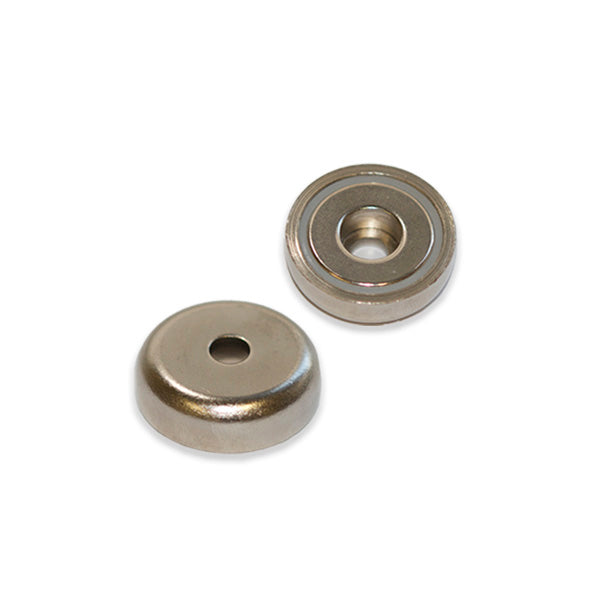Excellent
Service was great, delivery well within the estimated time and the product worked exactly as claimed.
Thank you.
Product code: AMFYPB20

Prices are GST Incl.
Volume pricing available on requestAustralia's Leading Supplier
Shipping Worldwide*
30 Day Returns
Same Day Dispatch*

This rare earth pot magnet has an outside diameter of 20mm and an inside diameter of 4.5mm with an internal flange hole of 8mm. This round hole pot magnet has a thickness of 7mm, a pull force of 6kg and a weight of 12 grams. It is identified by the AMF magnet part number AMFYPB20.
This Neodymium Pot Magnets has a round hole making them ideal for a range of holding mechanisms, be it slotting onto a rod, secured with a bolt or incorporated into a larger mechanical design. This 20mm diameter magnet is our second smallest pot magnet and is suitable for applications that are temporary or where a relatively low pull force is required. They are also easier to remove by hand than some of our larger, stronger pot magnets. The steel cup in which the magnet is set augments the magnetic field, creating a more powerful pull force than a stand-alone magnet. The protective cover on these pot magnets also means they are a single-sided magnet and the metal casing also helps to preserve the magnet from chipping or cracking, making it robust and reliable when in repeated use.
| ModelNo. | DØ | D1Ø | D2Ø | H | Holding force(kg) | Weight (g) |
| AMFYPB16 | 16 | 3.5 | 6.5 | 5 | 4 | 6 |
| AMFYPB20 | 20 | 4.5 | 8 | 7 | 6 | 12 |
| AMFYPB25 | 25 | 5.5 | 9 | 8 | 14 | 23 |
| AMFYPB32 | 32 | 5.5 | 9 | 8 | 23 | 36 |
| AMFYPB36 | 36 | 6.5 | 11 | 7.9 | 29 | 50 |
| AMFYPB42 | 42 | 6.5 | 11 | 9 | 32 | 73 |
| AMFYPB48 | 48 | 8.5 | 15 | 11.5 | 63 | 114 |
| AMFYPB60 | 60 | 8.5 | 15 | 15 | 95 | 240 |
| AMFYPB75 | 75 | 10.5 | 18 | 18 | 155 | 471 |
No FAQ available

NB: Ranges are indicative for product category, please check individual products for specic values within that range.



The most common coating for Neodymium magnets is Nickel + Copper + Nickel (Ni + Cu + Ni). This coating offers the magnet relatively good protection from corrosion and passive applications. If the magnet will be exposed to moisture or liquid then consider the use of an organic coating such as Epoxy. A hard wearing coating, Epoxy is suited to applications where the magnet will come under some friction or knocking.

Magnets are readily available in Blocks, Discs, Cylinders & Rings. AMF Magnetics specializes in the supply of short-run prototype magnets including Arc Segments, various magnetic orientations etc. If you need a magnet size that we don't carry in stock, submit a Design-a-Magnet enquiry for a quote on your custom magnet design.

Neodymium magnets are offered in several different grades. The first section N30-54 has an operating temperature of up to 80 degrees. Most of our stock only goes up to N38. The second section, denoted with the "M" prefix after the grade has an operating temperature 100 degrees. After this the grades are "H", "SH", "UH" & "EH". In order for the magnet to withstand a higher operating temperature, during production more of the raw material PrNd is incorporated as these elements have a naturally occurring resistance to high temperatures.

The Pull Force listed for each magnet is based on lifting 10mm thick steel from a horizontal surface. Magnets on a vertical surface (of 10mm thick steel) are generally able to hold around only 30% of the pull force listed in the product description. This is due to the effects of gravity and the lack of friction between the surface and the shiny magnet. Read More